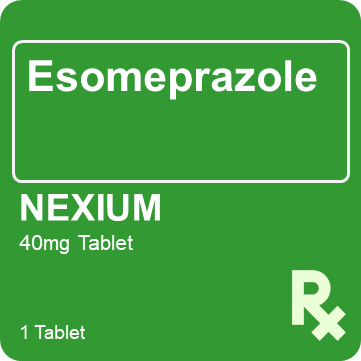
Nexium 40mg 1 Tablet
IMPORTANT NOTICE:
For this product, a doctor's prescription is required. Please do not forget to attach a copy of your valid prescription(.jpeg, bmp, gif, jpg, jpeg, jpe, jif, jfif, jfi, png, wbmp, xbm, tiff format). After you have placed your order, our pharmacist will be in touch to confirm your order and validate your prescription. Please present the original copy of your prescription upon the arrival of your order.
An item like loose capsule/tablets, ampules, vials, and refrigerated items is not subject for merchandise return or exchange upon completing the purchase.
| Brand Name | NEXIUM 40MG |
| Generic Name | Esomeprazole (as Magnesium Trihydrate) |
| Strength | 40mg Enteric coated tablet |
| Dosage Form | Tablet |
| Class Name | Proton pump inhibitor |
| Indication/Usage |
Esomeprazole (NEXIUM) tablets are indicated for: Following treatment with Esomeprazole (NEXIUM) IV: |
|
Dosage and Administration |
Adults If symptom control has not been achieved after 4 weeks, the patient should be further investigated. In combination with an appropriate antibacterial therapeutic regimen for the eradication of Helicobacter pylori and Children 12 – 18 years Children 1 – 11 years Children 0 – 1 year 1 – 11 months 0 – 1 month |
| Warning and Precautions | This medicinal product contains sucrose and glucose. Patients with rare hereditary problems of fructose intolerance, glucose-galactose malabsorption or sucrase-isomaltase insufficiency should not take this medicine. |
| Contraindication | Known hypersensitivity to esomeprazole, substituted benzimidazoles or any other constituents of the formulation. |
| Requires prescription? | Yes |
| Storage Conditions | Store at temperatures not exceeding 30°C, away from direct heat and sunlight |
| Manufacturer | AstraZeneca AB |
| Regulatory Classification | Prescription Drug |
1. We will deliver orders in the following areas (except in island barangays).
| a) Pangasinan ✔ Dagupan City |
|
| b) La Union ✔ Agoo |
|
| c) Ilocos Sur ✔ Tagudin |
|
| d) Ilocos Norte ✔ Laoag City |
|
| e) Bataan ✔ Orion |
|
| f) Abra ✔ Bangued |
|
| g) Pampanga ✔ Angeles City |
2. There are two (2) ways to receive your order:
a) via Home Delivery
b) via Store Pickup in any of the following St. Joseph Drug (pick-up point)i> branches:
✔ Perez Blvd., Dagupan City
✔ Mabini St., Poblacion West, Calasiao, Pangasinan
✔ Rizal St. corner Biagtan St., Poblacion, Mangaldan, Pangasinan
✔ Rizal St., Poblacion, San Fabian, Pangasinan
✔ Charms Bldg., Poblacion, Pozzorubio, Pangasinan
✔ CB Mall, Mc Arthur Highway, Nancayasan, Urdaneta, Pangasinan
✔ Zone 1 Market Road corner McArthur Highway, Villasis, Pangasinan
✔ Roxas corner Malong St., San Carlos, Pangasinan
✔ Calvo St., Mangatarem, Pangasinan
✔ Poblacion, Basista, Pangasinan
✔ Poblacion, Binmaley, Pangasinan
✔ Solis St., Brgy. Poblacion, Lingayen, Pangasinan
✔ Poblacion, Quezon Avenue, Alaminos, Pangasinan
✔ Concordia (Pob.), Bolinao, Pangasinan
✔ National Road, Poblacion, Bani, Pangasinan
✔ Mother Goose Bldg., Tapuac District, Dagupan City, Pangasinan
✔ Joleco Bldg., I, A.B. Fernandez Ave., Dagupan City, Pangasinan
✔ E&J Bldg., Milo Street, Manaoag, Pangasinan
✔ Panda Ave., Poblacion, Mapandan, Pangasinan
✔ San Guillermo, San Jacinto, Pangasinan
✔ Blue Horizon Bldg., Quezon Blvd., Poblacion, Alaminos City, Pangasinan
✔ CentroMart, Rizal St., Lingayen, Pangasinan
✔ Poblacion, Aguilar, Pangasinan
✔ Romulo Highway, Poblacion, Bugallon ,Pangasinan
✔ Gen. Luna St., Poblacion, Rosales, Pangasinan
✔ Quezon Blvd., Tayug, Pangasinan
✔ National Road, Umingan, Pangasinan
✔ Poblacion East, Alcala, Pangasinan
✔ M.H. Del Pilar St., Bayambang, Pangasinan
✔ CSI, Malasiqui, Pangasinan
✔ P. Tavera St., Poblacion, Binalonan, Pangasinan
✔ Guiset Sur, San Manuel, Pangasinan
✔ Poblacion West, Asingan, Pangasinan
✔ G/F Magic Mall, Alexander St., Urdaneta City, Pangasinan
✔ Poblacion, Infanta, Pangasinan
✔ Agbayani St., Poblacion, Sual, Pangasinan
✔ Poblacion, Urbiztondo, Pangasinan
✔ Poblacion, Sta.Barbara, Pangasinan
✔ Victoria Rd., San Nicolas Norte, Agoo, La Union
✔ CSI City Mall, Biday, San Fernando City, La Union
✔ Osmeña Street, San Fernando City, La Union
✔ Poblacion East, Rosario, La Union
✔ Brgy. Lacong, Tagudin, Ilocos Sur
✔ Hennady Bldg. McArthur Poblacion, Brgy. V, Bantay, Ilocos Sur
✔ National Highway, San Antonio, Candon City, Ilocos Sur
✔ Quezon Avenue, Vigan City, Ilocos Sur
✔ City Galore Square, J.P. Rizal cor. Ligo St., Laoag City, Ilocos Norte
✔ Trece Grande Bldg., 187 JP Rizal St. Cor. Dr. Damaso Samonte St. Brgy 19, Laoag City, Ilocos Norte
✔ National Road, San Vicente, Orion, Bataan
✔ Taft St., Zone 5, Bangued, Abra
✔ Washington St., Brgy 2 Abian, Batac, Ilocos Norte
✔ Middle Session, Baguio City, Benguet
✔ G/F Senvik Loy Bldg., La Trinindad, Benguet
✔ CSI Warehouse, Purok I Palanginan, Iba, Zambales
✔ Magic Mall, Poblacion, Sta. Cruz, Zambales
✔ Sto. Rosario St., Sto. Domingo, Angeles City, Pampanga
3. We charge the following delivery fee:
| Mode of Delivery | Delivery Fee |
|---|---|
| Home Delivery | Delivery fee starts at P60.00 for the first four (4) kilometers. Additional amount will be charged depending on the distance of the shipping address you specified (please refer to the Shipping Fee Directory). |
| Store Pickup | Free of Charge |
4. We will deliver your order as follows:
a) for Home Delivery
| Orders Received | Delivery Schedule |
|---|---|
| Before 1:00pm | Same day delivery within 2:00pm to 6:00pm |
| After 1:00pm | Next day delivery within 2:00pm to 6:00pm |
b) for Store Pick-up
You may expect your order to be ready within 2 hours to a day (depending on the availability of ordered item) upon placement of order. You will be notified via call/SMS once your order is ready for pick-up. We encourage you to claim your order within 3 days (during store hours) upon receipt of advice that your order is ready for pick-up, otherwise, such shall deemed as cancelled.
5. We will deliver your order from Monday to Sunday (including holidays) from 2:00pm to 6:00pm.
6. There are two (2) ways to track your order:
a) For every change in the order status, an email will be sent to you.
b) You can also check your order status by signing-in to your account. Just go to “My Account” and click “Orders” to display the order status.
7. In case you are not home when your order arrives, you may have a representative receive and pay the package for you. However, if payment was made via bank transfer, your representative shall be required to present the following:
a) Authorization Letter; and
b) Your Valid ID (with picture and signature) and that of your representative.
8. If nobody is available to receive your order, our Rider will bring your package back to St. Joseph Drug pick-up point branch nearest/ covering the shipping address you specified, for pick-up within the 3-day claiming period or you can have it redelivered but with a corresponding redelivery fee.
ITEM RETURN/ EXCHANGE/ REFUND1. All products ordered from St. Joseph Drug are subject to quality checking by our designated personnel prior to delivery to/ pick-up by customers.
a) Upon delivery to / pick-up by customer:
✔ Please inspect your package in the presence of our Rider/Pharmacy Assistant. Your signature on the Acknowledgement Receipt signifies that you have received the products completely, correctly, and in good condition (not damaged / defective and / or expiring / expired).
✔ You may refuse to accept the product if such is incorrect, incomplete, or not in good condition. For home delivery, we will redeliver the replacement or additional item/quantity free of delivery charge.
b) After delivery to / pick-up by customer:
✔ We will still accommodate request for item return / exchange / refund under the following conditions:
- Promptly returned within 7 days upon receipt of the product
- Duly supported by St. Joseph Drug official receipt
Note : We may require additional documents (e.g. photo of the affected product) to support your request.
✔ The following items will be acceptable:
- items in good condition provided such are:
- not in a vial
- not loose tablets/capsules
Note : The product must be in its original box/packaging (unused) and complete with gift/promo item (if any).
- products with explicit manufacturing defect
Note : Damaged / defective items due to customer's mishandling or improper use will not be accepted.
✔ Once your request is approved, we will redeliver the replacement or additional item/quantity but with a corresponding redelivery fee (except for products with explicit manufacturing defect which we will redeliver free of delivery charge).
✔ Requests for refund will be reviewed and handled on a case-by-case basis and subject to management's approval.
2. To request for item return/ exchange/ refund, perform any of the following:
a) contact 0917-565-3700 or 0998-530-3700; or
b) report via our live chat/ messaging; or
c) proceed to St. Joseph Drug Perez Blvd., Dagupan City branch.
Note : Request for return/ exchange/ refund of items ordered via our Online Store will not be accepted in any other St. Joseph Drug branches.
3. Requests for item return/ exchange/ refund will be processed within 2-3 working days upon receipt of the required supporting documents. You shall be notified via call/ SMS once the request has been approved.
Neque porro quisquam est qui dolorem ipsum quia dolor sit amet
Lorem ipsum dolor sit amet, consectetur adipiscing elit. Nulla at venenatis eros. Nulla efficitur, orci ut cursus consectetur, nisi elit convallis odio, non hendrerit arcu tortor aliquet eros. Nullam imperdiet diam ut neque ullamcorper semper. Mauris consequat ex sed elit venenatis, eu varius nulla posuere. Nullam gravida mattis velit, id commodo nunc rhoncus ut. Phasellus congue felis tortor, nec eleifend lacus tincidunt vitae. Nullam dapibus tempus tempor. Maecenas massa neque, tempus in efficitur at, scelerisque sed tortor. Morbi vulputate ipsum odio, non posuere sem suscipit accumsan. Cras fermentum nunc quis tempor iaculis. Praesent dictum augue sit amet neque faucibus, ac varius enim convallis. Curabitur volutpat ligula sit amet nibh vehicula egestas. Etiam eget dolor ipsum. Phasellus varius, metus sit amet aliquet tempor, erat ante rhoncus magna, quis vehicula tortor nunc at ipsum. Duis vitae erat vitae turpis cursus pretium. Quisque pulvinar sapien at mi efficitur, sed faucibus nulla accumsan.
Ut a leo interdum, imperdiet ante quis, euismod quam. Nam eget auctor risus. In a bibendum diam. Curabitur non lectus pharetra, maximus dolor mattis, auctor dolor. Maecenas placerat ipsum vitae elementum vulputate. Morbi lacinia libero lorem, in dignissim ante convallis at. Pellentesque habitant morbi tristique senectus et netus et malesuada fames ac turpis egestas. Sed in purus vulputate sem tempor tincidunt ac sed turpis. Pellentesque erat justo, feugiat eget vestibulum molestie, cursus ac ex. Phasellus magna enim, placerat non lacus varius, cursus consectetur urna
Phasellus finibus nulla vitae malesuada efficitur. Pellentesque habitant morbi tristique senectus et netus et malesuada fames ac turpis egestas. Phasellus sed pharetra risus. Quisque ante sem, faucibus id velit eget, bibendum sodales purus. Donec congue ipsum leo, aliquet aliquam lectus suscipit et. Pellentesque viverra, enim et pulvinar aliquet, dolor magna gravida lectus, sit amet pellentesque turpis elit id enim. Nulla a lectus viverra, ultricies urna ac, cursus turpis. Sed et purus vitae nunc molestie molestie sit amet eget nisl. Ut non nunc erat. Orci varius natoque penatibus et magnis dis parturient montes, nascetur ridiculus mus. Orci varius natoque penatibus et magnis dis parturient montes, nascetur ridiculus mus
Suspendisse imperdiet enim in porttitor dignissim. Nam iaculis enim vel nunc commodo cursus. Donec vitae magna eget nunc fringilla pharetra vitae id risus. Proin in aliquam ex. Ut purus sem, fermentum ut aliquam at, ornare quis nisl. Aliquam feugiat dapibus nunc, sit amet aliquam metus sollicitudin eget. Integer gravida ligula vitae leo suscipit, eget pretium augue tempus. Integer fringilla justo id purus pulvinar iaculis. Fusce in lorem pulvinar, suscipit ipsum id, volutpat dui. Fusce eu sem sapien. Duis sit amet nisi leo.

















